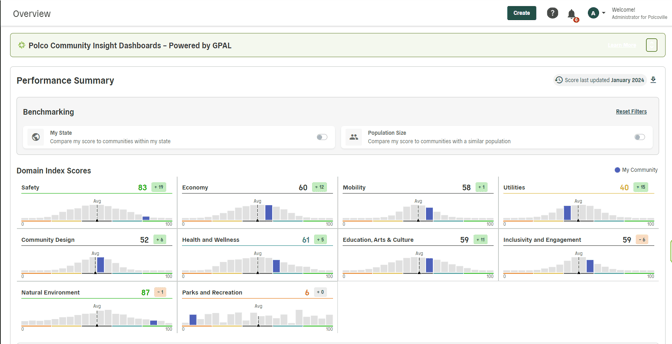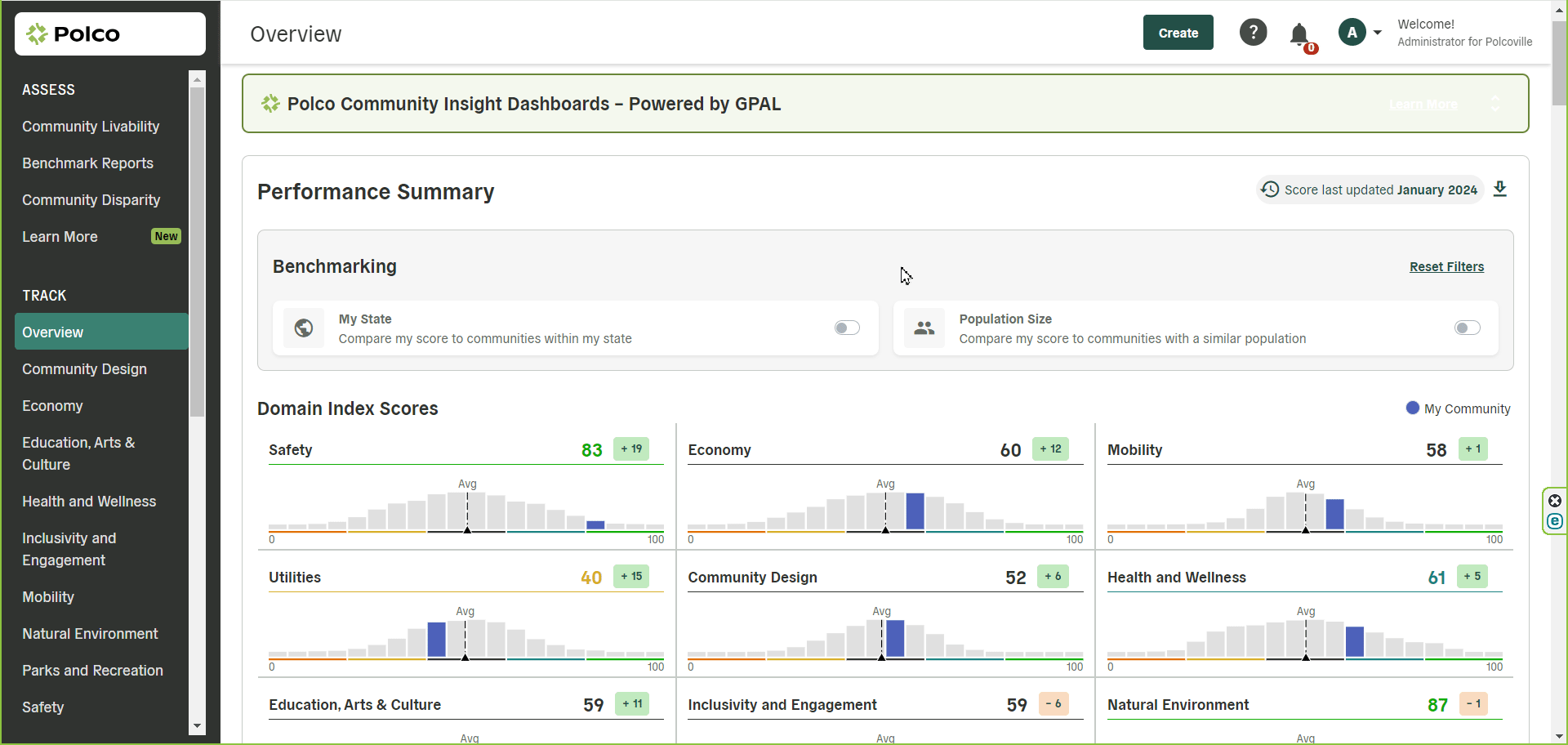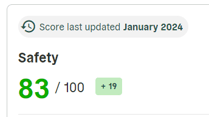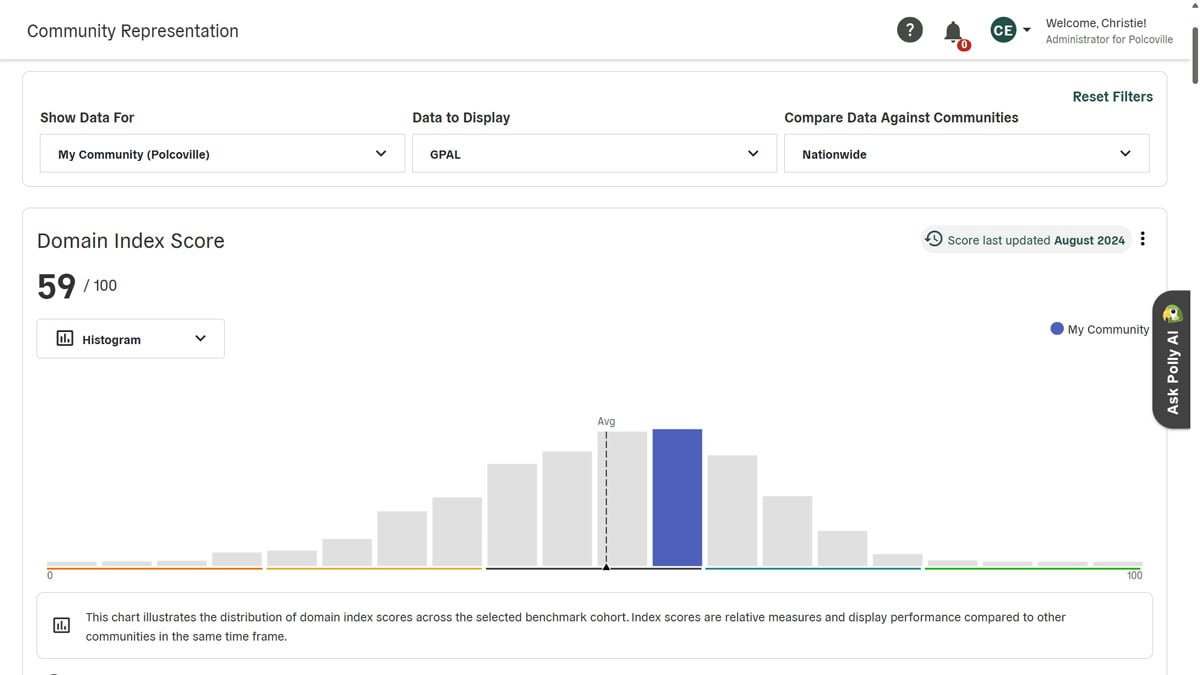Track Index Scores
By Knowledge Base on September 17, 2024
Index scores are one type of data shown in Track. Designed to provide a quick assessment at a glance, an index score is a single number that indicates a community’s overall performance within a given domain.

Index scores are calculated using specific data points within each domain, including both community statistics and resident sentiment data (when available). The index score represents the average percentile (or rank) of all indicators within a domain; for this reason, index scores offer a relative measure of performance compared to other communities within the same time period. For more in-depth information about how index scores are calculated, check out this article.
Index scores range from 0 (least positive) to 100 (most positive), with the midpoint of 50 being the average score (on par with other communities nationwide). An index score of 50 indicates that your community is similar to most others in that domain, whereas anything over 50 is above average.
The purpose of index scores is to provide additional context to the data. You can use index scores to:
- quickly identify your community’s areas of strength and opportunity
- measure performance over time across a specific domain
- compare your community’s performance to other communities across the nation, within the same state, or of similar population size
FAQs!
Do index scores include comparisons to other communities?
Yes! Index score calculations are based on the percentiles of each indicator (the percentage of other communities with scores lower than yours) and are, by nature, relative to the performance of other comparison communities. The histograms illustrate where your community ranks in comparison to others.
The default comparison shown is to all communities nationwide of the same type (e.g., comparing cities to other cities, or counties to other counties). You can use the benchmarking filters to narrow those comparisons to like communities within the same state and/or similar population sizes.

What is a “good” index score?
Index scores range from 0 to 100, with 50 being the average. An index score of around 50 indicates that your community aligns closely with most others in that domain—approximately half scored higher, and the other half scored lower. A score over 50 is considered above average.
Be careful not to equate index scores to a report card with letter grades (e.g., 70 = C and 60 = D). Instead, remember that a score of 50 is average (similar to peer communities), and certainly not “bad” by any means!
If your community scored lower than 50 in a domain, don’t be disheartened! Each community has unique challenges. We recommend considering your historical data (how the index score has changed over time; see screenshot below), using the additional benchmarking filters (narrowing comparisons by location or population size), and diving deeper using our domain dashboards (full of specific data points to help better understand where to focus efforts). Together, these can help determine how best to address this area of opportunity in your community.

How often are index scores updated?
Index scores are recalculated on a quarterly basis! Look for the “Score last updated” tag on your dashboard for more details.

Why did my index score improve/decline after conducting The NCS?
If your community has not yet conducted The NCS (or if resident sentiment data is otherwise unavailable), your domain index score will be based only on community statistics data. Once your community conducts The NCS, your index score will be re-calculated to factor in that newly acquired resident sentiment data.
Because many communities that conduct The NCS are competitive, high-performing organizations, index scores might decrease after conducting The NCS if your community ranked in lower percentiles for that domain. On the flip side, index scores may also increase after conducting The NCS if your community scored in higher percentiles for certain areas. In either case, our data scientists have considered how best to calibrate the influence that The NCS results have on the index scores, opting to make resident sentiment data account for only 10% of the total index score. Learn more about how index scores are calculated here.
Popular posts
Sign-up for Updates
You May Also Like
These Related Stories
What is included in Polco's Track Overview dashboard?

